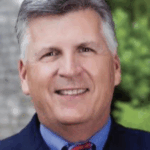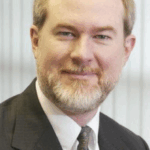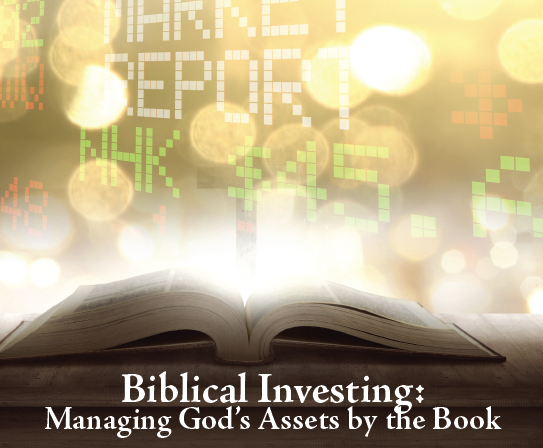[By Chuck Bentley (moderator), Robin John, Mike Kern, and Rusty Leonard, 2017]
Editor’s Note:
On April 28, 2017, the Center for Christianity in Business at HBU convened a panel of leading marketplace professionals to share their insights in the emerging Biblically Responsible Investing (BRI) industry. Being experienced investment experts who are also pioneers in this field, Rusty Leonard (Stewardship Partners), Robin John (Eventide Funds), and Mike Kern (Capstone Financial Services) discussed why and how Christians need to be proactive in choosing the companies they partner with as they invest. What follows is an edited excerpt of this enlightening discussion, moderated by Chuck Bentley (Crown Financial Ministries). It is presented here for the benefit of the general community of believers in the marketplace.
Bentley: When did you know God was calling you to be a professional money manager or investment adviser?
Kern: I spent close to two decades in investment banking work, mostly in Detroit before I moved to Texas five years ago. A couple of years ago I spent four days in a log cabin out in the woods with my Bible. When I came home I told my wife that after 19 years with the firm I was going to resign. I did. Soon after that I was recruited to run my current firm. It really was the Lord putting it all together. It was amazing to see how God prepares you along the way. What you do today paves the way for what God would have you do tomorrow.
Leonard: A high school teacher of mine encouraged me to get a broker’s license when I was 19 years old. I did.
John: I was 27 when I lost my previous job. I was chasing after success and fell flat on my face. I found myself praying and asking God to show me what He wanted me to do, even if it meant going to India or elsewhere to be in full time missions. I had been praying for six months when my partner, co-founder of our firm, and I started a house church in Boston. God planted this idea of the firm in our heads and it was born.
Bentley: Jesus’ parable of the Rich Young Ruler (Matthew 19:16- 26) could be a horrifying tale for the successful business man or woman out there. Where does the case for biblical investing fit in?
Leonard: I think Jesus in the parable was addressing the specific needs of that young ruler, not the general circumstance of every business man or woman. There is simply no case for every wealthy person to abandon all that they have to follow Christ. There is so much good that can be done through investing to help the world, the church, and people. Robin’s [John] firm for example gives a fair amount of money to charity as a result of their success in managing people’s money. We all know of many Christian business people who give generously because they are good stewards. At my firm we have another business (Ministry Watch) which helps people in affluence to give back to the Kingdom. Sometimes it makes our clients feel uncomfortable and perfectly illustrates how the rich young ruler might have felt.
John: Wealth itself is not evil. There are more than 2,000 verses that speak about wealth in Scripture. As examples, Deuteronomy says, “… you shall remember the Lord your God, for it is He who is giving you power to make wealth…” (8:18), and Proverbs reminds us that “Wealth obtained by fraud dwindles, but the one who gathers by labor increases it” (13:11) and “A faithful man will abound with blessings, but he who makes haste to be rich will not go unpunished” (28:20). When we invest we are partnering with companies in their work. In a pure sense investing is to provide capital to enable good businesses to flourish. These days investing has sometimes been divorced from its real purpose – trading (and speculating) has become an end in itself. In Leviticus 19, especially from verses 19 on, it talks about loving your neighbor as yourself. Yet it is discussed in the context of business operations: how business owners must treat their hired servants (employees) or the poor in the community. The kind of business we want to partner with and to enable them to flourish will drive our purpose as investors.
Kern: I believe the challenge Jesus gave to the young ruler in that story was more specifically about the First Commandment, “Thou shall have no other god before me.” Over the years I am in touch with many successful individuals who appear to carry a fair amount of guilt. I too had that feeling when the business was going great. I don’t think that kind of feeling is from God. God has gifted some people to create wealth (as Deuteronomy points out, above), and committing that wealth to wise investing can produce much good. First, Scripture reminds us that “a good person leaves an inheritance for his children’s children” (Proverbs 13:23). To be sure God has entrusted people to our care and investing offers a means for us to provide for their needs. Second, we are co-workers with God in His field. In Genesis God asks Adam and Eve to tend the garden after they were placed there, for by their work they may glorify God. The same can be said about wise investment decisions. Finally what do we do with the wealth once it is there? After all, the wealth we amassed is ultimately His. The goal of investing is not to store up treasure for ourselves but to further God’s work in His Kingdom.
The kind of business we want to partner with and to enable them to flourish will drive our purpose as investors.
Bentley: How do we distinguish between gambling, investing and speculating? Many people think gambling and investing are one and the same.
John: Earlier we quoted Proverbs [13:11, 28:20] which affirm that wealth made slowly is God honoring while wealth made hastily brings ruin because it is motivated by greed and discontentment, as well as a distrust in God. There is indeed considerable amounts of speculation in the stock market, as evidenced by frenzied day trading and momentum investing. This is not true investing. As professionals we look at the long term potentials of companies – companies that not only bring healthy long term returns, but also human flourishing and the common good. Warren Buffet said the stock market is a device to transfer money from the impatient to the patient. Evidence proves that God’s Word is true, even in the stock market.
Leonard: There will always be elements of greed in the financial markets. Students who want to get involved in this industry should expect to have employers who keep pounding this greed sentiment into you. Large firms aiming for profit might even choose practices that are not the most ethical. I would choose a career in this industry with a lot of care and wisdom.
Kern: Hearken back to the gospel according to Dusty Springfield:
“Wishin’ and hopin’ and thinkin’ and Prayin’ and plannin’ and dreamin’ each night of his charms; That won’t get you into his arms, So if you’re lookin’ to find love you can share; All you gotta do is hold him and kiss him and love him, And show him that you care…”
Gambling is like “Wishin’ and hopin’ and thinkin’ and prayin’” – it is rolling the dice and getting something for free without doing any work. Investing is more like “holding, kissing, loving…” It is the active pursuit of an objective, such as a reasonable (or “adequate”) return. God has given us intellect; and we can’t check our intellect at the door when it comes to investing.
Bentley: I like to share with my son that gambling requires everybody to lose so I can win. God does not honor that. God purposes investing as an activity that everybody can win. The company wins because they provide useful product and services to the customer. The investor wins as the company succeeds and the customer enjoys the benefits. This forum is convened on the premise that there is a distinction between how the world invests and how Christians should invest. What then is Biblically Responsible Investing (BRI)? How does it differ from Socially Responsible Investing (SRI) that is more familiar to investors?
If we do things that bring Him glory, earthly rewards are not guaranteed. If by doing so we do suffer disappointing earthly results, who would we rather serve? Do we serve for the applause of men, or for the applause of our Savior and Creator?
Leonard: BRI in essence means investing in a way that glorifies God. What would Jesus do if he were investing? More specifically, someone seeking God’s will should probably stay away from “sin” organizations, such as those involved in porn or abortion activities, or even financial institutions that take advantage of the poor. One of our ministries, the BRI institute, offers a service of filtering or screening companies based on biblical values. It is a service helpful to Christian investors or money managers who want to consult such criteria when making investment decisions.
John: SRI and BRI have overlaps and share certain things in common. The key difference is that in BRI we have the Bible as our compass, while SRI is based on personal value systems that can vary according to worldviews. Generally speaking SRI originates from liberal movements that focus on socially conscious themes like the environment (sustainability), corporate governance, consumer protection, diversity, human rights, etc. The overlap with BRI is found in “ethical” filters such as gambling, tobacco, pornography, or alcohol.
Bentley: Doesn’t filtering, or for that matter a focus on BRI, necessarily compromise investment returns or result in subpar performance?
Leonard: Not exactly. Statistically, it turns out if we stripped out the “offensive” firms the historical returns are almost identical to the broader market. The perception that filtering gives inferior performance is not factually supported. Realistically there are plenty of choices remaining out there even after the violators are excluded from the opportunity list. In any case investment managers routinely apply filters when they make investment decisions, whether it is based on valuation or other criteria.
John: I would argue that even if BRI does lead to underperformance, Christians should in conscience be steadfast to pursue them. Take the example of the tobacco industry. In Papua New Guinea, 55% of the boys and 40% of the girls between 13 and 15 are addicted to cigarettes. In Indonesia the figure is like 40% of the boys and 2% of the children 4 years old. Indonesia’s average age of smokers is just 7 years old. The fact is big tobacco companies exploit these children and plunder them for monetary gain. These companies have unabashedly shifted their strategic focus from the developed to the developing world in order to sustain growth in revenue and profit.
Wouldn’t it be sad to know that many of us here in U.S., even in this forum, are profiting with these tobacco manufacturers through their unjust acts overseas? Philip Morris, Altria, and British American Tobacco, the largest global tobacco firms, can claim their major shareholders among the largest U.S. mutual funds. Shockingly some of the largest owners in these firms are the 529 College Savings funds. For example, among the biggest investors in Philip Morris is Virginia529, one of the nation’s largest 529 plans. Put differently, many American parents are unwittingly saving for their children’s education on the back of the exploited children in the emerging economies. These funds benefit from the addiction of young smokers in these poor countries as they provide steady streams of profit, paid out as dependable streams of dividend payments, by the tobacco firms. It would be sobering to read, if we could, the words in Proverbs in this light:
“My son, if sinners entice you, do not consent… If they say, let us ambush the innocent [the young addicted smokers in foreign lands]
We’ll find all kinds of precious wealth [profitable investment returns, education savings]… We shall fill our house with spoil [401K accounts, 529 plans]…
Throw in your lot with us [retirement savings, college savings]… We shall all have one purse [a safe investment, a profitable company]…
Do not walk in the way with them… For their feet run to evil…
But they lie in wait for their own blood, they ambush their own lives, Such is the way of everyone who gains by violence [by greed and unjust acts]. (Proverbs 1: 10-19)
Kern: Granted it is an imperfect science, and we live in an imperfect world. The fact is there are funds out there which are run on biblical values and yet are not underperformers by any means. Scripture says “Whatever you do, do your work heartily, as for the Lord rather than for men” (Colossians 3:23). When Joshua was fighting the battle at Jericho, God gave instructions for a battle plan that doesn’t make much sense to him. The same goes for us. We would be better off by being obedient even if God’s instruction is not so humanly convincing. If we do things that bring Him glory, earthly rewards are not guaranteed. If by doing so we do suffer disappointing earthly results, who would we rather serve? Do we serve for the applause of men, or for the applause of our Savior and Creator?
Bentley: How do we draw the line between the saints and the sinners? What about differences in leadership style and management philosophies; where do they come in?
John: In our firm we look at products and services of the companies as well as their business practices. Are they contributing to human flourishing? We call it value creation to serve, and value extraction means to exploit. We want companies that serve their stakeholders or neighbors well, and that applies to their customers, employees, suppliers, environment, and society as a whole. We believe these firms have a generally more sustainable business model that would perform well over long term. As an example, Costco pays three times more per employee than Walmart yet they are more profitable per store. We want companies that do a better job than their peers in creating value and blessing the world. Yes we avoid ill gone gains such as tobacco or abortion, but we would rather invest in a drug that cures terrible diseases than one that has purely cosmetic applications.
Bentley: Should we buy products from companies that we also refrain from investing in? Does Apple meet the BRI criteria, for example?
Leonard: Apple was in fact one of the hardest decisions in the history of the BRI Institute. It was so tempting to have Apple in the mix for “saints,” but unfortunately the firm is involved in pornography. It is a very small portion flowing through their website, but it is their homosexual pornographic podcast. We had to make a choice to drop Apple as a result. You can imagine how hard it is for an investment manager to take this action. It was really a test from God. Yet we know God is faithful and will provide other opportunities to make up for this loss. Indeed we found that to be the case.
Should we still buy Apple products? I am of the opinion that a shareholder has a higher degree of responsibility to implement screening than a consumer. As a shareholder you are profiting from the firm’s actions. As a consumer you are likely using the product for good. In the end I believe each of us has to decide for ourselves as a consumer what is the right thing to do.
John: I look at it as the difference between patronage and ownership. If you patronize a convenience store which sells tobacco and porn and lottery tickets, your purchase of orange juice or milk encourages the owner to put more orange juice and milk on the shelf and hopefully less of the other offensive products because you avoided them. If more customers are like you, it might actually turn the owner’s actions around. As an owner, you profit from all the products you sell. You then have a higher moral responsibility. Having said that there is an even better outcome if as a consumer you patronize a competitor that sells none of the offensive products, if there is one across the street. That’s what we Christians probably should choose to do.
Kern: We Christians are in the world, but not of the world (John 17:14-16). As Billy Graham says, we go into the world to live for Christ as a witness to the world, to become salt and light (Matthew 5:13-14), and have our sociological, political (and yes, business) influence upon the world. In other words, our actions count. That is the bottom line.
About the Panelists
 Chuck Bentley (moderator) is the CEO of Crown Financial Ministries, which was founded in 1976 by the late Larry Burkett. Today the ministry has outreach in 104 nations. Chuck is the author of four books, including his most recent, The Worst Financial Mistakes in the Bible, And How You Can Avoid Them. Chuck is the executive producer of the God Provides™ film series, now used throughout the world in 30 languages. He also produces a daily radio broadcast heard on over 1,200 outlets in the U.S. Chuck and his wife, Ann, both graduates of Baylor University, have been married since 1978 and reside in Knoxville, TN. They have four sons, a daughter-in‐law, and four grandchildren.
Chuck Bentley (moderator) is the CEO of Crown Financial Ministries, which was founded in 1976 by the late Larry Burkett. Today the ministry has outreach in 104 nations. Chuck is the author of four books, including his most recent, The Worst Financial Mistakes in the Bible, And How You Can Avoid Them. Chuck is the executive producer of the God Provides™ film series, now used throughout the world in 30 languages. He also produces a daily radio broadcast heard on over 1,200 outlets in the U.S. Chuck and his wife, Ann, both graduates of Baylor University, have been married since 1978 and reside in Knoxville, TN. They have four sons, a daughter-in‐law, and four grandchildren.
 Robin John is co-founder and CEO of Eventide Asset Management, a Boston-based Registered Investment Advisor to the family of Eventide Mutual Funds. Under his leadership, the firm has grown into a leader within the socially responsible and faith-based investment marketplace, with approximately $2 billion in assets currently under management. Robin was named to the “2016 Ten to Watch” list by Wealth Management Magazine. Robin has a degree in Economics from Tufts University and resides in Dallas, TX.
Robin John is co-founder and CEO of Eventide Asset Management, a Boston-based Registered Investment Advisor to the family of Eventide Mutual Funds. Under his leadership, the firm has grown into a leader within the socially responsible and faith-based investment marketplace, with approximately $2 billion in assets currently under management. Robin was named to the “2016 Ten to Watch” list by Wealth Management Magazine. Robin has a degree in Economics from Tufts University and resides in Dallas, TX.
 Mike Kern, III, is the President & CEO of Capstone Financial Services, a Houston-based financial advisory and asset management firm. Mike started his professional career as an analyst at Stout Risius Ross (SRR), where he held a variety of management roles over a span of 19 years, including as President of the firm in the last six years of his tenure with the firm before he left to join Capstone. Mike was the recipient of Crain’s Detroit Business ‘40 Under 40’ Award and is a member of the CFA Institute and Young Presidents’ Organization. Raised in the Detroit area, Mike graduated with a B.S. in Finance and Business Economics from Wayne State University. He resides in Houston with his wife, Amanda and their four children.
Mike Kern, III, is the President & CEO of Capstone Financial Services, a Houston-based financial advisory and asset management firm. Mike started his professional career as an analyst at Stout Risius Ross (SRR), where he held a variety of management roles over a span of 19 years, including as President of the firm in the last six years of his tenure with the firm before he left to join Capstone. Mike was the recipient of Crain’s Detroit Business ‘40 Under 40’ Award and is a member of the CFA Institute and Young Presidents’ Organization. Raised in the Detroit area, Mike graduated with a B.S. in Finance and Business Economics from Wayne State University. He resides in Houston with his wife, Amanda and their four children.
 Howard J. “Rusty” Leonard is the Founder and CEO of Stewardship Partners, a Charlotte, N.C., based investment manager and a recognized leader in the field of Biblically Responsible Investing (BRI). He is also the owner and CEO of the Biblically Responsible Investing (BRI) Institute, the leading organization that compiles information on the actions of public corporations that might be of concern to Christian investors. Prior to forming Stewardship Partners, Rusty was Executive Vice President of Templeton Investment Counsel, Inc. Rusty and his wife Carol are also co-founders of Wall Watchers, a ministry that provides insightful research reports on Christian ministries for use by current and prospective donors to those organizations (www.MininstryWatch.com). Rusty is a member of the CFA Institute and holds a BBA (double major in Finance and Economics) from Temple University. Rusty and his wife Carol have three grown children and reside in Chester Springs, PA.
Howard J. “Rusty” Leonard is the Founder and CEO of Stewardship Partners, a Charlotte, N.C., based investment manager and a recognized leader in the field of Biblically Responsible Investing (BRI). He is also the owner and CEO of the Biblically Responsible Investing (BRI) Institute, the leading organization that compiles information on the actions of public corporations that might be of concern to Christian investors. Prior to forming Stewardship Partners, Rusty was Executive Vice President of Templeton Investment Counsel, Inc. Rusty and his wife Carol are also co-founders of Wall Watchers, a ministry that provides insightful research reports on Christian ministries for use by current and prospective donors to those organizations (www.MininstryWatch.com). Rusty is a member of the CFA Institute and holds a BBA (double major in Finance and Economics) from Temple University. Rusty and his wife Carol have three grown children and reside in Chester Springs, PA.








